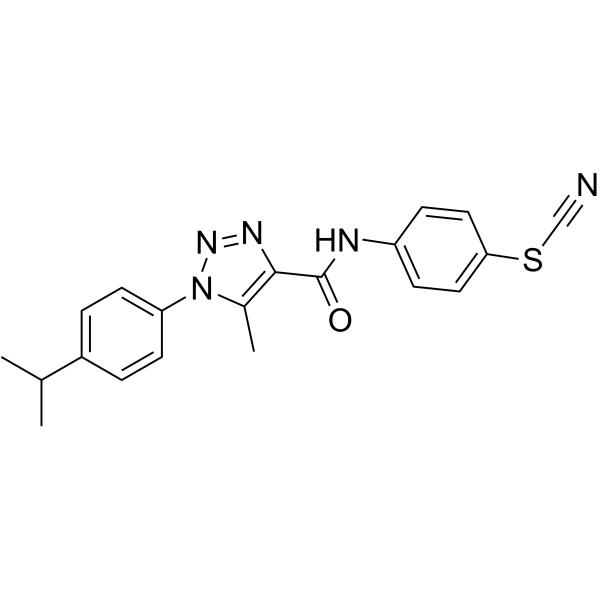Anticancer agent 83
Modify Date: 2025-08-27 14:50:39

Anticancer agent 83 structure
|
Common Name | Anticancer agent 83 | ||
|---|---|---|---|---|
| CAS Number | 904815-29-8 | Molecular Weight | 377.46 | |
| Density | N/A | Boiling Point | N/A | |
| Molecular Formula | C20H19N5OS | Melting Point | N/A | |
| MSDS | N/A | Flash Point | N/A | |
Use of Anticancer agent 83Anticancer agent 83 is a potent anticancer agent, inhibits LOX IMVI cells growth with a GI50 value of 0.15 mM. Anticancer agent 83 reduces mitochondrial membrane potential and induces DNA damage to induces leukemia cells apoptosis[1]. |
| Name | Anticancer agent 83 |
|---|
| Description | Anticancer agent 83 is a potent anticancer agent, inhibits LOX IMVI cells growth with a GI50 value of 0.15 mM. Anticancer agent 83 reduces mitochondrial membrane potential and induces DNA damage to induces leukemia cells apoptosis[1]. |
|---|---|
| Related Catalog | |
| In Vitro | Anticancer agent 83 (compound 4a) (0.01-100 μM; 24 h) showing strong activity towards human colon carcinoma HCT116 p53−/− cells with deletion of P53 gene (GI50=8.4 μM), human epidermoid cervix carcinoma KB3-1 (GI50=7.4 μM), human ovarian carcinoma Skov 3 cells (GI50=10 μM), and human chronic myelogenous leukemia K562 cells (GI50=5.4 μM)[1]. Anticancer agent 83 (0.5 μM; 24 h) interrupts DNA stability and induction of apoptosis in Jurkat cells, and decreases mitochondrial membrane potential[1]. Cell Viability Assay[1] Cell Line: Human colon carcinoma HCT116 p53−/− cells with deletion of P53 gene, human epidermoid cervix carcinoma KB3-1, human ovarian carcinoma Skov 3 cells, and human chronic myelogenous leukemia K562 cells Concentration: 0.01, 0.1, 1, 10, 100 μM Incubation Time: 24 hours Result: Inhibited cell viability in different cells with GI50s of 8.4 M (HCT116 p53−/−), 7.4 M (KB3-1), 10 M (Skov 3), and 5.4 M (K562), respectively. Immunofluorescence[1] Cell Line: Jurkat cells Concentration: 0.5 μM Incubation Time: 24 hours Result: Induced morphological changes (including apoptotic bodies, membrane blebbing, chromatin condensation), and DNA fragmentation in Jurkat T-cells. |
| References |
| Molecular Formula | C20H19N5OS |
|---|---|
| Molecular Weight | 377.46 |
| InChIKey | YVZLYBOOUTVSFY-UHFFFAOYSA-N |
| SMILES | Cc1c(C(=O)Nc2ccc(SC#N)cc2)nnn1-c1ccc(C(C)C)cc1 |